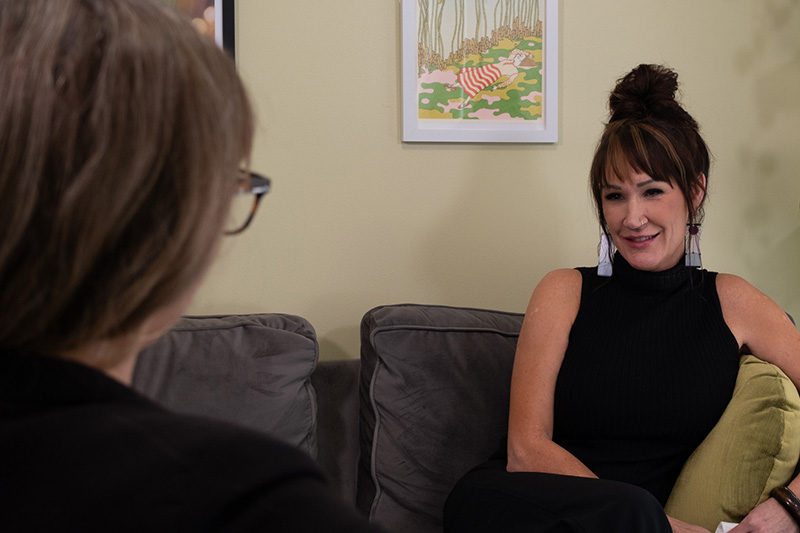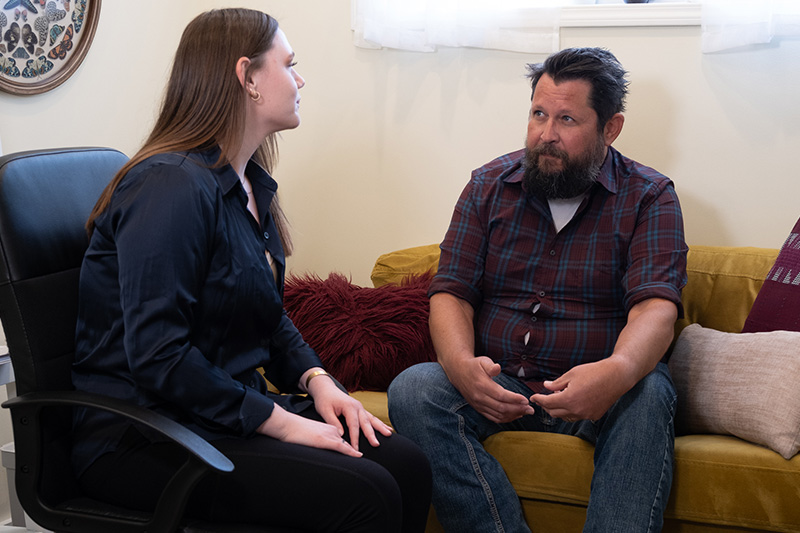Services we offer at Heartland Therapy Connection
Our team of therapists at Heartland Therapy Connection all offer Telehealth and in-office appointments to best accommodate your needs. Weekend and evening appointments can also be arranged as needed.
Areas Of Practice
- Adolescent Counseling
- Anxiety
- Children Counseling
- Depression
- Dialectical Behavior Therapy
- EMDR
- Family Counseling
- First Responders & Veterans
- LGBTQIA+ Affirming Counseling
- Men’s Counseling
- Parent-Child Interaction Therapy
- Relationship Counseling
- Sexual Assault & Abuse Survivors
- Trauma Counseling
Adolescent Counseling
Let’s face it – it’s tough being a teenager! You often find yourself in this “no longer a child, not yet an adult” place where it’s hard to feel like you fit in! You’re growing up and starting to form your own identity. You’re standing on the edge of all sorts of exciting firsts and changes – driver’s licenses, first jobs, romantic relationships, and high school graduations. It’s a unique and exciting time in your life like none other!
New changes bring new responsibilities and concerns, leading to difficult questions like, “Who am I?” and “What do I want to do with my life?” As others start asking about college, careers, and future plans, it can feel overwhelming. You might also struggle to connect with your family, feeling like they still see you as a child rather than recognizing your emerging identity. Adding to the challenge, as your body changes, mood swings become harder to manage, and feelings of depression or anxiety might start impacting your daily life.
Absolutely, navigating your teenage years can be difficult, but you don’t have to do it alone. At Heartland Therapy Connection, our counselors are trained to meet you where you are, understanding the unique challenges of this stage in life. We’re here to listen and create a safe space for you to express yourself and work through the issues you’re facing. Using a blend of Cognitive Behavioral Therapy (CBT) and Dialectical Behavior Therapy (DBT), alongside an understanding of adolescent development, our team can help you manage the emotional turmoil. Once you have the coping skills to better handle your thoughts and feelings, we can dive into the deeper issues behind those emotions.
Counseling won’t solve all your problems, but it will equip you with the tools and coping strategies to navigate the changes in your life. Therapy helps you manage your emotions, making the lows less intense and the highs more lasting. It also builds communication skills that enhance relationships with friends and family. We can even explore college and career planning to help you create a roadmap for your future. It won’t be easy, but it will be worth it!
Call or send us a message online to schedule a consultation with one of Heartland Therapy Connection’s counselors today.

Anxiety
The constant feeling of anxiety can be overwhelming, even debilitating. A relentless cycle of anxiety can leave you feeling paralyzed and unable to address any issues you may be struggling with. From disrupting sleep and hindering concentration to causing actual physical tension or pain. Panic attacks, rapid heartbeat, difficulty breathing, and a sense of impending doom are all symptoms of anxiety.
Working with a professional counselor at Heartland Therapy Connection can help you manage your anxiety more effectively. Our team of counselors assists clients every day in identifying anxiety triggers, developing stress-reducing coping skills, and challenging negative thoughts. Through mindfulness, grounding exercises, and other self-care practices, you will learn to control stress and build resilience so you can move forward with greater confidence and less worry.
Call or send us a message online to schedule a consultation with one of Heartland Therapy Connection’s anxiety counselors today.
Children Counseling
At Heartland Therapy Connection, we believe in the importance of mental health throughout every stage of life. During a child’s formative years, the foundations of their sense of self and belonging are established and these will have a lasting impact on them as they continue to develop. Now is the best time for your child to develop healthy coping skills that they can use to weather life’s ups and downs.
When it comes to the mental health of your children, your role is pivotal. As they are still learning to communicate their emotional needs, it is your responsibility to read the signs, recognize when something is wrong, and intervene. Mental health concerns can manifest in a wide range of symptoms and behaviors, such as mood swings, irritability, changes in appetite or sleep schedule, dwindling friend groups, aggression, and more. Any of these could be a sign that your child could benefit from counseling.
The counselors at Heartland Therapy Connection utilize play for their therapy sessions with children. Play is the primary language of children. It can be used as a powerful tool to unlock understanding, process trauma, address anxieties, and learn life-long coping skills. The integration of play in the therapeutic setting helps children interpret what they are feeling and fully express themselves. Additionally, our counselors incorporate evidence-based therapies, such as Cognitive Behavioral Therapy (CBT) and Narrative Therapy, to further explore the interaction between a child’s thoughts and feelings.
The integration of both individual and family therapy is essential in achieving your child’s therapy goals. Sessions will mainly involve one-on-one time between your child and the counselor, providing a safe space to discuss difficult issues. Family involvement is crucial for reinforcing skills learned during therapy, so parents or guardians will be kept informed and may participate in sessions as needed. The therapist may also help facilitate family discussions to support the child’s progress.
Through counseling, your child will gain a “toolbox” of effective coping skills to manage emotions and handle distressing situations. They will learn to regulate their emotions better and develop communication skills to express their feelings to you and others. This foundation will help them grow into a more resilient and self-aware individual.
Call or send us a message online to schedule a consultation with one of Heartland Therapy Connection’s counselors today.

Depression
If you’re feeling overwhelmed, struggling to complete basic tasks, and finding yourself increasingly isolated and disinterested, you may be suffering from depression. Depression can manifest in various ways, including difficulty getting out of bed, lack of focus, frequent crying, and a pervasive sense of hopelessness about the future. These feelings are more than just mood-related; they impact your motivation, concentration, sleep, eating habits, interest in activities, and more. Sometimes depression can lead to thoughts of suicide as a way to escape the pain.
There is hope. Heartland Therapy Connection offers support with trauma-informed approaches to address the underlying issues affecting your well-being. Our counselors utilize several therapeutic methods to address depression, including Interpersonal Therapy, ACT (Acceptance and Commitment Therapy), DBT (Dialectical Behavior Therapy), CBT (Cognitive Behavioral Therapy), and Narrative Therapy to help clients identify core values and behaviors that promote well-being. By collaborating with clients, Heartland Therapy Connection counselors assist them in accepting, challenging, and modifying negative thoughts and behaviors. Clients learn skills to manage stress, communicate effectively, and regain functionality.
Call or send us a message online to schedule a consultation with one of Heartland Therapy Connection’s counselors today.

Dialectical Behavior Therapy (DBT)
What is Dialectical Behavior Therapy (DBT)?
Have you ever experienced outrage at something that would seem minor to someone else? Have you ever experienced feeling “numb,” “shutting down,” or full body anxiety? These are a few examples of how having a low tolerance for negative events and intense emotions can impact our daily lives. Dialectical Behavior Therapy, or DBT, can help you calm these waves of emotions and also ignite a transformative journey, enhancing your ability to manage the more difficult parts of life.
DBT was created in 1970 by Marsha Linehan for people struggling with chronic suicidality and borderline personality disorder. While DBT is still the go-to therapy for these groups, it also has a wide variety of skills and beliefs that the counselors at Heartland Therapy Connection believe are helpful for every client.
How Will DBT Be Used in Your Session?
Dialectical Behavior Therapy (DBT) emphasizes creating a “life worth living,” which is a personal and unique endeavor for each individual. Whether you’re collaborating with a therapist to identify reasons to live or seeking a deeper connection with your authentic self, DBT supports you at every stage. The therapy focuses on unlocking your potential and aligning your life with your genuine needs and values, reinforcing the belief that you can achieve your goals.
DBT equips clients with essential tools from four key modules: mindfulness, distress tolerance, emotion regulation, and interpersonal effectiveness. Mindfulness helps you become aware of your thoughts and feelings without judgment, while distress tolerance teaches you to manage overwhelming emotions. Emotion regulation enhances your ability to cope with adversity, and interpersonal effectiveness provides strategies for setting boundaries and maintaining healthy relationships. If you’re looking to navigate life’s challenges and develop skills for emotional management, DBT may be the right fit for you.
Call or send us a message online to schedule a consultation with one of Heartland Therapy Connection’s counselors today.

EMDR
Eye Movement Desensitization and Reprocessing therapy (EMDR) is a valuable alternative for healing from trauma. It helps individuals process distressing memories through guided bilateral stimulation, such as eye movements, mimicking natural memory processing during REM sleep. This therapy is beneficial for survivors of abuse, individuals with PTSD, anxiety disorders, grief, and those who struggle to express emotions verbally.
At Heartland Therapy Connection, our licensed EMDR therapists provide a structured approach to reduce emotional distress, alleviate symptoms, and foster empowerment. EMDR’s holistic method engages both mind and body, offering a promising path for trauma recovery and emotional resilience.
EMDR therapy offers a promising pathway for individuals looking to heal from trauma and reclaim their lives. By engaging both the mind and body in a structured process of memory reprocessing, EMDR helps individuals reduce the emotional distress associated with traumatic memories and fosters a sense of empowerment and resilience. If you or someone you know is struggling with the lingering effects of trauma, EMDR may provide the support and healing needed to move forward with renewed strength and clarity.
Call or send us a message online to schedule a consultation with one of Heartland Therapy Connection’s counselors today.
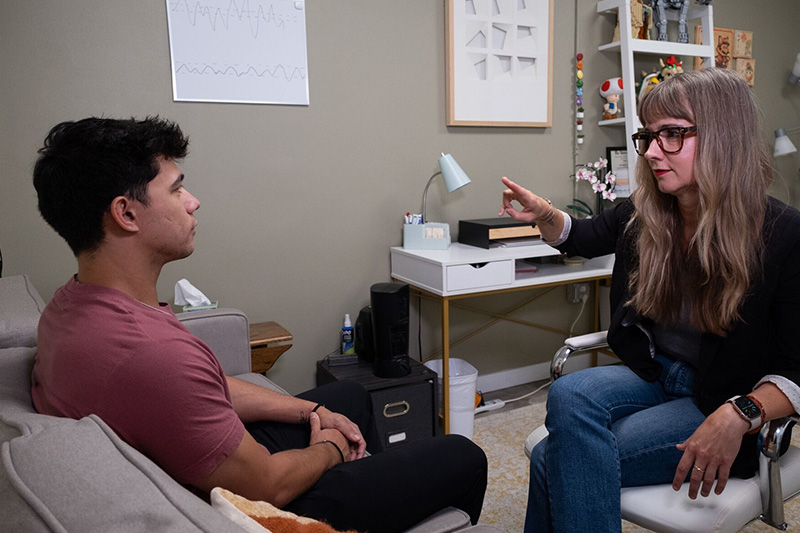
Family Counseling
Parenting is undeniably rewarding, as children bring vitality and unique perspectives that fill our hearts with love and joy. However, parenting also comes with significant challenges, often feeling like the most demanding job without a manual. Parents may face difficulties when their child suddenly becomes sad or withdrawn, or when behavioral issues arise at school, leading to concerns about slipping grades or inappropriate conduct.
Heartland Therapy Connection is here to help! Our counselors understand the unique challenges that come with parenting. Together, we will look beyond the “right or wrong” ways to handle conflict and find the best approach for each family member. Using this family system approach, specific issues can be pinpointed and addressed. Our counselors will also help each family member find coping skills to help regulate emotions when tensions get high.
Call or send us a message online to schedule a consultation with one of Heartland Therapy Connection’s counselors today.
First Responders and Veterans
Repeated exposure to actual or threatened death can deeply impact both the mind and body, leading to constant feelings of being on edge and an inability to relax. First responders and veterans may struggle with uncontrollable memories, flashbacks, and nightmares that make it difficult to function in daily life. Negative thoughts, guilt, and distrust of others often accompany these experiences, making it hard to connect or find joy. However, these reactions are a natural response to trauma, not a sign of being “broken” or “crazy.” The ongoing distress keeps the brain in a state of hypervigilance that hinders the healing process.
Counseling for first responders and veterans can help. The counselors at Heartland Therapy Connection can work with you to decrease the distressing symptoms and learn coping skills to help find relief. Our counselors use strategies such as EMDR (Eye Movement Desensitization and Reprocessing), ACT (Acceptance and Commitment Therapy), DBT (Dialectical Behavior Therapy), CBT (Cognitive Behavioral Therapy), Narrative Therapy, and other trauma-informed processing therapies. These approaches are designed to help you feel safe, stabilized, and prepared to reprocess your experiences. Heartland Therapy Connection counselors help their clients find relief in as few as three sessions, establishing stabilization before moving on to the reprocessing phase.
Our counselors also offer workshops, presentations, reading materials, and consultations specifically for first responders. We provide education on the effects of trauma and offer hope to first responders and veterans.
Call or send us a message online to schedule a consultation with one of Heartland Therapy Connection’s counselors today.
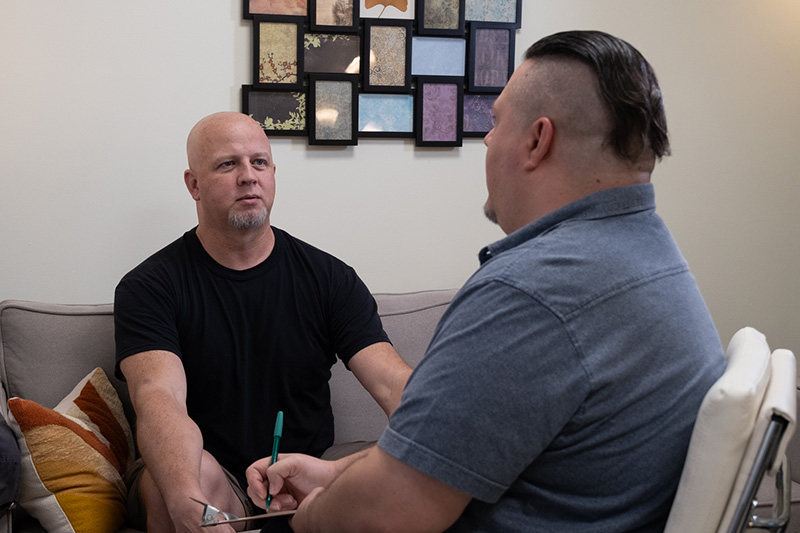
LGBTQIA+ Affirming Counseling
The diversity of identification and expression found within the LGBTQIA+ community demonstrates the complexity of Queer identity. It’s an ongoing challenge to identify ourselves in a world built by/for heteronormative norms that don’t apply to us. Yes, Queer rights and visibility have grown over recent decades. However, renewed legislative and legal attacks on the rights and lives of transgender people highlight the legal, social, and political anxiety central to the experience of being Queer in America.
It’s a challenge to simply survive in a heteronormative society that is often hostile to Queer identity and rights. Many LGBTQIA+ people struggle to find an authentic sense of wholeness and self-derived authenticity rather than being defined in opposition to heteronormativity. It’s no wonder that, according to the National Alliance on Mental Illness, Queer people are between two and four times more likely to experience a mental health condition than their heteronormative peers. Queer-affirming care considers the unique challenges and pressures LGBTQIA+-identified people face in addition to the stresses of everyday living.
Working one-on-one in a private, confidential environment, Heartland Therapy Connection’s LGBTQIA+ affirming counselors can help give you the tools and coping skills you need. We will help you work towards finding an authentic expression of self, driven by your priorities, values, and needs. Furthermore, counseling can help you to manage and express your emotions in positive ways. Therapy can help you improve your sense of wellness, improve communication skills, and deepen connections with those you love. We see you, you are important, and we’re ready to help.
Call or send us a message online to schedule a consultation with one of Heartland Therapy Connection’s counselors today.
Men's Counseling
Living as a man in modern America comes with many stressors and complicated expectations, oftentimes without sufficient support. According to research by the Substance Abuse & Mental Health Services Administration (SAMHSA), approximately 20% of American adults experience a clinically significant episode of depression every year. While men are somewhat less likely to experience depression, only 60% of men experiencing symptoms seek treatment compared to 72% of women. Suicide statistics show the impact of inadequate support for men. Men are four times more likely to die by suicide than women. Furthermore, for American men under the age of 45, suicide is the second-most common cause of death. As a man navigating this stressful world, you deserve the right support to live your life to the fullest.
In a private, confidential setting, Heartland Therapy Connection counselors provide the tools and coping skills necessary to take on life’s challenges. Our counselors understand and can assist in managing and expressing emotions to enhance overall well-being as well as improve communication skills. This leads to better relationships and deeper connections with loved ones. The importance of this work cannot be overstated, and support is available when ready to take the next step.
Call or send us a message online to schedule a consultation with one of Heartland Therapy Connection’s counselors today.
Parent-Child Interaction Therapy (PCIT)
Parent-Child Interaction Therapy, also known as PCIT, is an evidence-based treatment model designed to help address disruptive behaviors in children ages 2-and-1/2 to 7. Behavioral issues in young children can manifest as physical or verbal aggression, short attention spans, difficulty regulating emotions, meltdowns, tantrums, destructiveness, excessive whining, constant crying, interrupting others, or other attention-seeking behaviors. When these problems are making it challenging for your child at home or school, PCIT may be the right solution for your family.
PCIT is a two-phase treatment that involves both the child and the parent working together with a trained therapist. During phase one, called Child Directed Interaction (CDI), the therapist coaches and guides the parent with an earpiece through play sessions with the child in a form of two-way mirror therapy. The therapist works with the parent to help the child develop PRIDE skills, which are essential for increasing those necessary positive interactions and connections.
P – Praise
R – Reflection
I – Imitation
D – Describe
E – Enjoy
Phase two is called Parent Directed Interaction (PDI) and this is when the therapist works with the parent to develop effective disciplinary protocols to curb unwanted behaviors. Parents learn the commands necessary to properly direct the interactions.
- PCIT is one of the most researched treatment approaches for children with over 300 studies being completed globally. While parents are left feeling more confident in their parenting style, children gain:
- Security with their caregiver.
- Increased attention span and ability to share and take turns.
- Decreased frequency, intensity, and duration of tantrums.
- Decreased hyperactivity and attention-seeking behavior.
- Increased confidence and self-esteem.
- Increased adult compliance and improved behavior at home and in public.
- Decreased aggression, destructiveness, and defiance.
Heartland Therapy Connection offers PCIT for families experiencing behavioral issues in children ages 2-and-1/2 to 7. Treatments typically last 12 to 18 sessions and can take place in person at Heartland Therapy Connection’s Brookside office or through telehealth virtual sessions.
Call or send us a message online to schedule a consultation with one of Heartland Therapy Connection’s counselors today.
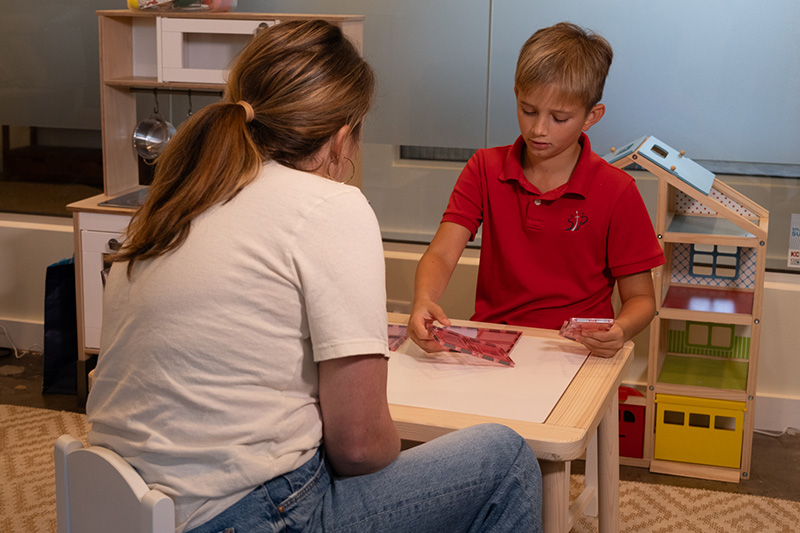
Relationship Counseling
Many people face challenges in their personal relationships, which are a fundamental part of feeling vital, purposeful, compassionate, and that they have a sense of worth. While healthy relationships embody shared values, effective communication, and empathy, achieving them can often feel daunting or difficult. The struggle to maintain these connections frequently brings people into therapy. These struggles are typically influenced by a blend of inherent traits and life experiences.
The counselors at Heartland Therapy Connection explore personal relationship challenges through the lens of early attachment. When those first relationships in your life were neglectful, lacked emotional expression, or took place in unstable or confusing environments, the blueprint you follow in your subsequent relationships has been altered. Without adaptation, learning to trust or communicate effectively can become difficult.
Our counselors believe evidence-based therapies, such as DBT (Dialectical Behavioral Therapy) and EMDR (Eye Movement Desensitization and Reprocessing), can help you develop adaptive behaviors and challenge old habits. These approaches promote mindful insight, emotional awareness, and effective communication skills. With these tools, you can achieve both acceptance and change while addressing relationship issues effectively. Improvement is possible, and you have the power to make it happen with the help of the Heartland Therapy Connection team!
Call or send us a message online to schedule a consultation with one of Heartland Therapy Connection’s counselors today.
Sexual Assault & Abuse Survivors
There is so much shame ingrained in our society regarding sex, sexual trauma, and gender roles. Not to mention… just mentioning these topics. Child and adult survivors of sexual assault (and ALL forms of unwanted sexual experiences) often suffer in silence. Sometimes survivors have spoken up and have faced disbelief, victim-blaming, or repercussions in their friendships or relationships. At Heartland Therapy Connection we BELIEVE you and we believe you are worthy of healing.
Sexual assault or abuse can inflict severe physical and emotional pain that can significantly impact your daily life. Survivors often experience intense anxiety, recurrent and distressing thoughts or memories of the abuse, and feelings of self-hate, guilt, panic, and a lack of safety. Physical symptoms may include chest pains or digestive issues, and survivors might feel jumpy, startled, or plagued by nightmares and disturbed sleep. Additionally, depression, dissociation, numbness, avoidance of reminders, difficulty concentrating, trust issues, and anger are common. Traumatic experiences are processed differently in the brain, which shifts into “survival” mode during such events. As a result, emotions, memories, and reminders can become trapped in the brain’s emotional centers.
Heartland Therapy Connection counselors are here to help survivors develop coping skills to reduce the severity of their symptoms and feel safe in the face of distress or danger. As a client’s distress lessens, they can begin to move forward with their life. Providing support for our clients is Heartland Therapy Connection’s primary goal. Our counselors utilize a wide range of evidence-based approaches such as Eye Movement Desensitization and Reprocessing (EMDR), Internal Family Systems (IFS), Dialectical Behavior Therapy (DBT), and Narrative Therapy. These methods not only provide relief, but can be useful in organizing confusing thoughts or mixed feelings for overall healing.
Call or send us a message online to schedule a consultation with one of Heartland Therapy Connection’s counselors today.
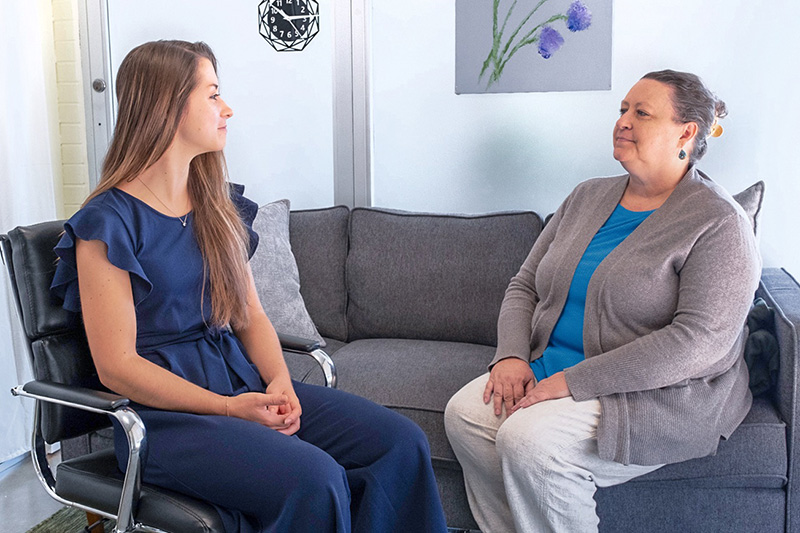
Trauma Counseling
We understand that trauma can deeply impact individuals in various ways, shaping thoughts, emotions, and behaviors. Our therapists are dedicated to providing trauma-informed care, recognizing the unique needs of each person who walks through our doors.
Understanding Trauma
Trauma can be defined as a deeply distressing or disturbing experience that overwhelms an individual’s ability to cope. It can stem from a single event, such as an accident or natural disaster, or it can be the result of ongoing experiences, such as chronic emotional abuse or neglect. Complex trauma refers to exposure to multiple traumatic events, often of an invasive, interpersonal nature, which can lead to a myriad of psychological challenges.
Trauma can affect individuals from all walks of life, regardless of age, background, or culture. It’s essential to approach the topic of trauma with sensitivity and an understanding that everyone’s journey is different.
Signs You May Be Experiencing Trauma
Recognizing trauma can be challenging, especially when its effects may manifest in subtle or unexpected ways. Here are some common symptoms to consider:
- Emotional Dysregulation: Frequent mood swings, irritability, or feelings of hopelessness.
- Intrusive Memories: Recurrent, distressing memories or flashbacks related to past traumatic events.
- Avoidance: Steering clear of reminders of the trauma, including people, places, or activities.
- Hyperarousal: Heightened anxiety, a persistent sense of danger, or difficulty sleeping.
- Low Self-Esteem: Feelings of worthlessness, self-blame, or a distorted self-image.
- Dissociation: A sense of detachment from reality or oneself, often feeling numb or disconnected. This may also look like difficulty remembering aspects of a traumatic memory.
If you resonate with any of these symptoms, it’s essential to know that you’re not alone, and there is hope for healing. These symptoms are treatable!
How We Can Help
At Heartland Therapy Connection, we believe in the resilience of the human spirit and the propensity for healing. Our therapists are trained in various evidence-based approaches to address trauma, providing you with the tools and support you need to navigate your journey toward recovery.
A Few of our Therapeutic Approaches
- Eye Movement Desensitization and Reprocessing (EMDR): This therapy helps individuals process and integrate traumatic memories. Through guided eye movements or other forms of bilateral stimulation like tapping, EMDR allows you to reprocess distressing experiences, reducing their emotional charge and leading to more adaptive beliefs.
- Cognitive Behavioral Therapy (CBT): CBT focuses on identifying and changing negative thought patterns and behaviors associated with trauma. This structured approach empowers you to develop healthier coping strategies and perspectives.
- Dialectical Behavior Therapy (DBT): Originally developed for borderline personality disorder, DBT is effective for trauma as well. It combines cognitive-behavioral techniques with mindfulness practices, helping individuals manage intense emotions and improve interpersonal relationships with evidence-based tools.
- Internal Family Systems (IFS): IFS therapy recognizes that our minds are made up of different parts, each with its own feelings and roles. This approach helps you explore these parts, understand their origins, and foster inner harmony, which can be particularly beneficial for those with complex trauma.
A Supportive Environment
We create a safe, compassionate space where you can feel understood and supported. Our trauma-informed therapists prioritize your comfort and autonomy, guiding you at your own pace. We aim to empower you to process your experiences and cultivate resilience.
Take the First Step
If you or someone you know is struggling with the effects of trauma, we invite you to reach out. Our team is here to listen and provide the support you need. Together, we can work toward healing, helping you reclaim your narrative and move forward with greater peace and confidence.
Our licensed therapists in Missouri and Kansas are committed to your journey. Feel free to contact us to learn more about our trauma therapy services or to schedule an appointment. Your journey to healing starts here, and we are honored to be part of it.
Call or send us a message online to schedule a consultation with one of Heartland Therapy Connection’s counselors today.

Need More?
If you don’t see the exact category you were hoping for, please reach out and let us know! With therapists from a variety of backgrounds and with our own specialties and areas of strength, we are quite likely to be able to meet your needs.

